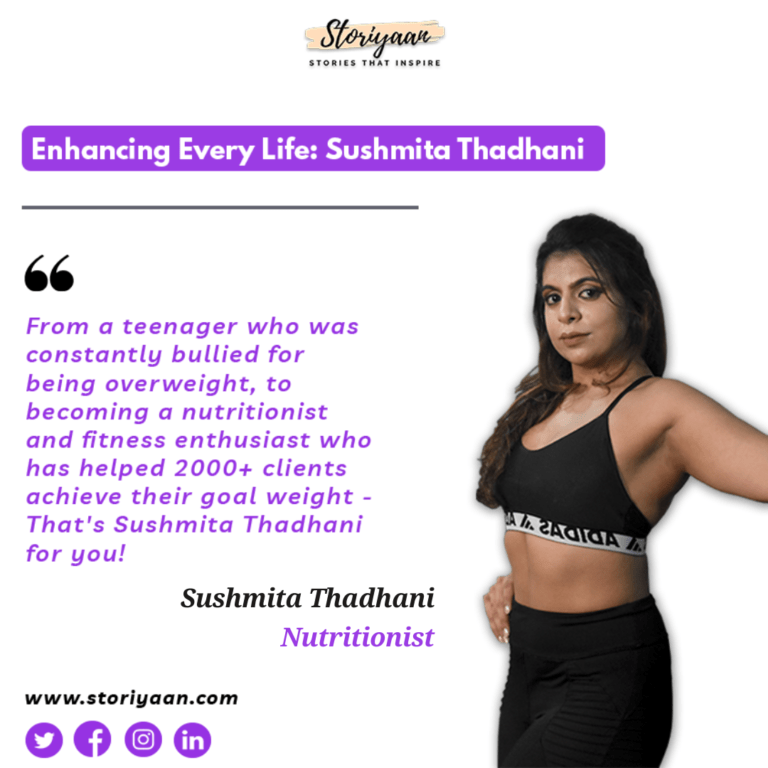In a candid conversation with Storiyaan, Sushmita opened up about her fat to fit life, the challenges she encountered and generously shared her diet recommendations. She further tells, “I was bullied in school and called names like alien due to my weight, which impacted my mental health. Despite, my love for skirts, I lost the confidence to wear them due to bullying. The journey has not been easy but I was never defeated.”
Sushmita Thadhani is a Nutritionist and Fitness Enthusiast who only recommends the tried & tested diet charts and fitness routines. Her meticulous knowledge of nutrition and health has made her confident to help clients with underlying medical conditions and diseases. Sushmita keeps her clients motivated and ensure their spirits are high with positivity and encouragement. Read further to discover the basics of a happier and healthier life.

Interview
Questions and answers
What were the major factors that gravitated you towards a nutrition and wellness profession?
Back in school, I was bullied for being overweight. It affected my mental health and aggravated my body-image issues. Consequently, I went on a one month crash diet which did help me lose 10kg but was unhealthy and resulted in health problems. Furthermore, I started gaining weight again and finally, I decided to become a nutritionist myself to make this process easier for myself and others.
What has been the most challenging phase in your journey towards a healthier life?
Being ridiculed for my weight and not letting that get the better of me was the most challenging task. Although, I was excellent in extra-curricular activities, I was still judged and mocked for my weight. Once, I was selected for a Fashion Show as my Ramp-walk was praiseworthy but a friend took offence. Despite being taller she got rejected for being chubby; nevertheless, I got in.
What are the major shifts happening in public perceptions of nutrition that you have noticed in recent years?
There has been a substantial change in the health perspective. More and more people are becoming conscious of their food, lifestyle choices and want to improve upon them. People are getting into workouts, diet plans and better sleep schedules to facilitate proper healthy living.
What is your definition of “healthy eating” and how can students and office-goers incorporate this practice into their daily life?
Healthy eating for me is a balanced diet. Students & Office goers can have a multi-grain veggie wrap with paneer, brown rice and daal, or a vegetable sandwich, sprout salad or carry protein shake, nuts and seeds. Apart from that, they should also try to keep themselves hydrated and set reminders in case they forget.
How do you put forth an amalgamation of healthy and sustainable diet plans for your clients while also customizing them according to their lifestyle?
Modifying the diet according to the client’s lifestyle is important and much-needed. If a client dislikes protein-rich food, I recommend shakes instead. If they are a student I recommend ready-made food like pancakes or oats. When I know my clients have a cook and they can manage complex recipes, then only I prescribe something time-consuming, if at all.
How often do clients need to follow up to prevent redundancy in their diet and what can be the negative effects of prolonged consumption of the same diet?
At times, even if you are healthy you don’t lose weight. It is because your body is used to it and needs a diet change. Although there are no negative effects, you might not see results if your diet remains the same. Therefore, I make sure to follow up with my clients every week to solve their issues or queries and change their diet plan every 30 days.
You mentioned that you only recommend diet and fitness plans that you have had personal experiences with. What are some of the worst diet plans that you have experienced in your career?
Some of the worst diet plans I have come across includes only fruits, liquid or detox diets. Detox diets are unnecessary as your kidney does the job of detoxing and only liquid or one meal a day are some diets that are extremely unhealthy.
What is your opinion regarding the intake of supplements in people’s diets who do not suffer from any major deficiency?
I endorse and recommend supplements for everyone. It is because the veggies or fruits we intake are deficient in nutrients due to fertilizers. Moreover, it is humanly impossible to meet your regular nutrient requirements with only diets. For example, to meet your daily calcium requirements you will have to consume 3-4 litres of milk which is not possible.
A lot of people suffer from low mental health when they go on diets and extreme workouts for quick weight loss. How do food habits affect the mental health of a person?
Extreme food diets can affect you mentally. Thus, I consider my client’s preferences and allow them to indulge in some snacking once in a while. There is no harm to have your guilty pleasures once in a blue moon. This ensures you are as invested in your journey as you wished to be initially.
A lot of people, often athletes, resort to the use of steroids for quicker body goals. What are the major side effects and why is it such a widely-used practice despite these well-known downsides?
Usually, bodybuilders require steroids for quicker results. But their side-effects might involve impotency, hair loss, hormonal fluctuations, organ enlargement or failure, death and heart stroke. They are widely used due to the surety and the quickness of results. Moreover, the lack of awareness about their long-term harmful effects does influence over-use.
Quick 5
1. Your proudest moment – When I had my first successful council session.
2. What’s your motto? Health is an investment, not an expense.
3.What’s the one thing you’d suggest people keep in their kitchen if they want to cook healthy meals? Olive oil and spices.
4. Your greatest motivator – My mother.
5. The best inspirational quote you’ve heard – “Change begins only when you step outside your comfort zone.”

